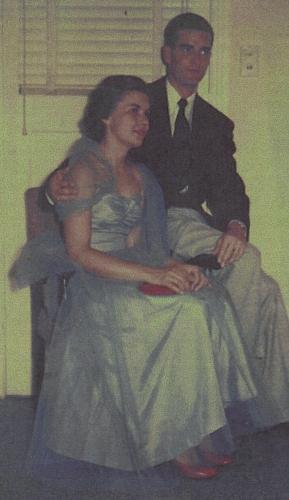Veterans Kenneth and Jean Beard
KENNETH AND JEAN BEARD
He always wanted to fly. She wanted to be a nurse. And somehow, through the chaos of the Korean War, they found each other.
Ken writes in his 1988 autobiography:

I was 14 years old when Joliffe Wilson’s father took me up for flight over his farm in Virginia. The thrill of sitting in my front seat of his Piper Cub still lingers in my mind. That’s when I first dreamed of flying my own plane to escape the realities of the earth. Many years later, the realities in the sky over North Korea were neither that of the dream nor of the earth.
Ken, the son of a school teacher, began his college career at Virginia Tech, but later transferred to the Spartan School of Aeronautics in Tulsa, Oklahoma so he could work on airplane engines. His first job was with Boeing in Seattle. It wasn’t long, though, before he trained as a pilot and went to fight in the Korean War.
In later years he wrote:
Trying to forget the devastating aspects of war apparently will never be possible for me. It is now 49 years later (and counting) and I have tried to recall the details leading up to each successful mission. Hitting the target and returning to base was the true order of priorities…. The typical route to Korea departed Yukota, Japan, normally to the north into the wind, and to avoid the populated areas of Japan just off the south runway. Judicious flight planning routed us around the populated areas of Japan whenever we had bombs aboard. After leaving the coast, we would cross the Sea of Japan on a northwest heading and hit the coastline of Korea south of the 38th parallel, then turn north to the target area. These first raids were conducted in the daylight and were of shorter duration than the night raids that were soon to come.
One of his later entries reads:
Will my inner stress and the guilt of all the deaths ever heal. I doubt it, certainly not completely, but perhaps…I am beginning to see a glimmer of light in the far distance. Never forget, the real heroes are those who gave all they had to offer – their lives.
After the Korean War ended, Ken went back to his family and to his work in Boeing, writing Flight Manuals for the B-47 and later for all the Convair aircraft. Then later his work involved developing and testing component parts.
He writes:
After all these years, my inner scars from the War have not healed, but I still hope for peace of mind. Somehow I need to find a true morality for the War.
Jean Swanson was born in 1929 in Cornwall, Virginia, a town owned by the South River Lumber Co. When she was in her early teens, her family moved to central Pennsylvania where she enjoyed picnics, skating parties, and board games. Her family later returned to Rockbridge County. Jean went on to study nursing at the University of Virginia, graduating in 1950. When she graduated, though, she was faced with a problem: what to do?
Jean writes:
I was so busy for three years that I had not thought what to do next. The Korean War started that summer, so I decided to try for the Air Force in the hopes of becoming a flight nurse. Early in January I arrived at Lackland AFB in San Antonio. There was a number of us arriving at the same time….I was assigned to the Medical and Psychiatric section. The nurses that were there had been working 12-hour shifts, seven days a week, so they were happy to see us.
Many of the patients Jean tended were psychologically wounded men from the war zone who had been evacuated back to the States. “It was controlled chaos,” she says of the nursing unit where she worked. “I didn’t understand the psychological problems until much later. The kids weren’t prepared. It was a hostile, brutal time. And they were scared to death, I think. Some were literally climbing the walls.”
Not long after beginning her nursing career at Lackland, Jean received a phone call from a man stationed at nearby Randolph Field, a lieutenant named Ken Beard who had received Jean’s phone number from an aunt. “We met,” writes Jean, “and that was the end of my thinking about a military career.”
Jean and Ken married. In 1955 they moved to California where for eight years Jean was a stay-at-home mom. She later returned to work at various hospitals, eventually working as a nurse at the University of California – Irvine health clinic.
“War doesn’t solve many things,” Jean says now. “Maybe,” she concludes thoughtfully, “just maybe people wouldn’t be so anxious to go to war if they took care of the patients I worked with.”
As told to Jean Kilby